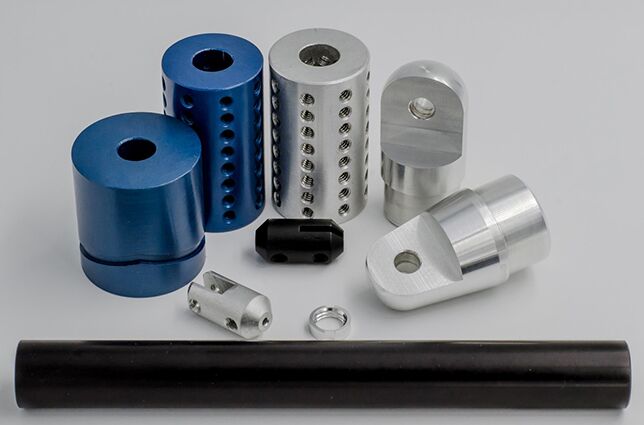Why Anodize Precision Machined Components?
Anodization greatly improves wear and corrosion resistance for aluminum and other nonferrous metals. The electrochemical process is a reliable, affordable way to improve a precision machined component’s quality and lifespan. Anodizing also enhances aesthetics, creating a permanent change in the metal’s color and reflective qualities.
Developed in the 1920s, anodizing has been a tremendous boon for industries seeking stronger and more lightweight metals. Today, anodization is a popular finishing process for precision CNC machined components of all kinds. Anodized aluminum is common in various architectural elements, including decorative exterior panels and aluminum extrusions for window frames.
The Anodization Process
Anodizing mimics the natural oxidation process that normally causes ferrous metals to corrode. Under strict laboratory settings, the same process can instead render nonferrous metals more resistant to corrosion. Aluminum is very amenable to anodizing, due to its low weight and high initial corrosion resistance, but there are also anodization procedures for magnesium, zinc, titanium, and other metals that do not contain iron.
For aluminum, the most common anodization method involves submerging the metal in a sulfuric bath. The acid creates microscopic pores called nanopores across the aluminum’s surface. Applying an electric current in the presence of a cathode causes the acid to release oxygen ions, which bind to the aluminum to form an oxide layer.
At this stage, it’s possible to alter the metal’s color according to the required specifications. The final step is to apply a sealant, which closes the oxide layer’s nanopores and any possible micro-fissures.
Materials
Anodizing is very effective for most aluminum grades, such as aluminum 6061 and 7075, due to their optimal machining properties. These grades establish particularly strong bonds with the oxide layers during the anodization process.
Anodized aluminum can result in an extensive range of colors and finishes, ranging from matte black to subtle shades with a polished, metallic sheen. By boosting aluminum’s already impressive corrosion resistance, anodizing enhances the material’s performance and lifespan.
For more specialized applications, anodizing is also suitable for precision CNC machined components made from titanium and zirconium. Being a more reactive metal, titanium can be challenging to anodize, but if done skillfully, anodized titanium has increased wear resistance and unique colors. Anodized titanium is typically chosen for more technical design requirements.
Like aluminum, zirconium has high initial corrosion resistance, ideal even for marine applications. Its exceptional biocompatibility also makes anodized zirconium an excellent choice for precision-machined components in medical implants.
Benefits and Considerations of Anodizing
The benefits of anodized CNC machining parts depend on several factors, such as the grade of the substrate, the specific anodizing process, part design, and component application. Generally, anodizing precision machined components yields a number of important benefits:
- Strength and Durability: By changing the material’s molecular structure, anodizing creates a surface that will not peel or chip, and it’s extremely resistant to mechanical wear and corrosion. An effective seal should provide at least five years of protection, even in outdoor environments. Still, it’s important to test an anodized material before relying on it for a given time period.
- Cost-Effectiveness: Anodized CNC machined parts cost less than painted or plated alternatives and are far more durable and longer-lasting.
- Low Maintenance: An anodized metal will retain its polished luster over the majority of its lifespan. It’s also easy to clean, only requiring soap and water.
- Aesthetics: The innate molecular/structural changes of anodized metals mean they retain their color and metallic sheen. There are numerous colors available, which can be easily reproduced in subsequent production runs.
Anodizing Services From Pioneer Service
Since 1990, Pioneer Service Inc. has provided customers with high-quality precision parts. Anodizing is a cost-effective and reliable finishing process for aluminum components. Our network of metal finishing experts specializes in numerous anodizing processes, producing clear, yellow, green, red, and black color finishes. As an ISO 9001:2015 and AS9100D certified manufacturer, we subject all anodized CNC machining parts to thorough quality control procedures and inspections. Contact us to discuss your project today.



